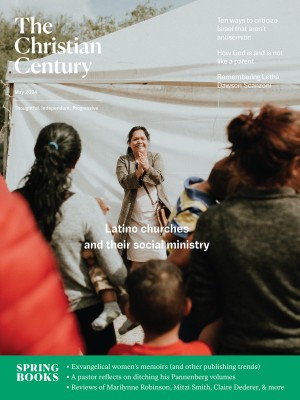May 26, Trinity B (John 3:1–17)
Sometimes being truly free in the Spirit means being deeply bound to the outworking of God’s mission in the world.
This famous encounter between Jesus and Nicodemus features a haunting interplay of freedom and destiny. On the one hand, the exchange contains one of the Bible’s more vivid pneumatological descriptions: “The wind blows wherever it pleases. You hear its sound, but you cannot tell where it comes from or where it is going. So it is with everyone born of the Spirit.” The linkage of wind to Spirit has a deep pedigree in both the Hebrew Bible and the New Testament, and here we see anticipated the role that the Holy Spirit (or, at least, invocations of it) has indeed played throughout the Christian tradition: while it has occasionally been seen as the stabilizer of church authority (i.e., a Spirit-guided church cannot err, or a Spirit-filled prophet cannot be wrong), the Spirit has just as often served as a disrupter of business as usual within the church. From the Montanist movement to the radical Reformations to Azusa Street, appeals to the Spirit have been the occasion for empowering marginal or subjugated voices in the church (for good, ill, or both). In that sense, the Spirit has meant freedom.
However, this conversation also signals the Johannine Jesus’ early awareness of the fate that awaits the end of his ministry. “Just as Moses lifted up the snake in the wilderness, so the Son of Man must be lifted up.” What can it mean that the same Jesus who speaks of the Spirit in terms of freedom and unpredictability speaks of the Son’s fate in such inexorable terms?
Read our latest issue or browse back issues.
Here we come face-to-face with a christological representation of what many ethicists have taught for a long time: that dealing with the gospels (and with the call of the Spirit upon our lives) challenges any notion we might have that freedom is primarily about the absence of constraint. This negative definition of freedom, however necessary it might be as a condition of true freedom, is not enough—not enough to do justice to freedom in Christ and not enough to do justice to the demands of justice in our world. What is needed is the more positive definition of freedom as alignment with the good, as being captivated by the truth and beauty and goodness of God. This has often been pithily captured in the notion of “freedom for” as opposed to “freedom from,” with the latter being a necessary but not sufficient condition of the former.
To be free, in other words, is to be bound up in God’s own goodness and its outworking in a broken world. Theologian Reinhard Hütter captured this well in the title of a book of essays on the Spirit and the church: Bound to Be Free. David Bentley Hart, meanwhile, argues in That All Shall Be Saved that overcoming the typically American individualist negative definitions of freedom—that prioritize, among other things, freedom of the will as absence of God’s coercion toward salvation—in favor of a more compelling notion of freedom for Christ is crucial for a truly Christian outlook on God’s action, in this world and the next.
John’s Gospel is unique among the four in that Jesus’ demeanor and rhetoric throughout the text is suffused with a philosophical calmness about this dynamic. John’s Jesus largely displays an almost stoic acceptance of the impending crucifixion, even as he preemptively and consistently places its importance within a broader missional context—not least in the famed words of John 3:16. It is tempting to view this as bordering on a Docetic “floating above” the emotions of true humanity; those who feel that way might well prefer the comparatively more frenetic and emotive Jesus of Mark or Matthew.
But I prefer seeing John’s Jesus as one who has deeply and existentially onboarded this paradox of the Spirit’s freedom: there are times when being truly free in the Spirit means being deeply bound to the outworking of God’s mission in the world, with all the consequences of the fact that this mission and this world are so often fragmented and broken. In that sense, Jesus is not just a teacher of the Spirit but an embodiment of it, to the cross and the empty tomb and beyond. And, like Nicodemus, we are invited to witness and ponder what this call to freedom might look like in our hurting world.





